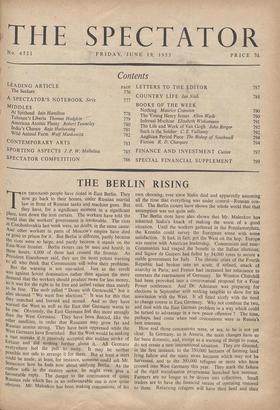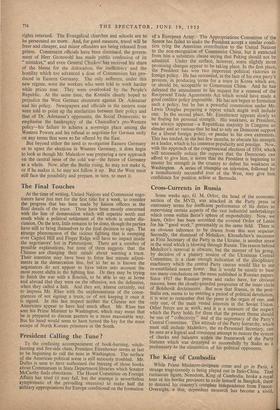THE BERLIN RISING
TEN THOUSAND people have rioted in East Berlin. They now go back to their homes, under Russian martial law in front of Russian tanks and machine guns. But they have, for a significant moment in a significant place, torn down the iron curtain. The workers have told the World that the workers' government is intolerable. The riots in Czechoslovakia last week were, no doubt, in the same cause. And other workers in parts of Moscow's empire have died or gone to prison for it. But Berlin is different, partly because the riots were so large, and partly because it stands on the East-West frontier. , Berlin rioters can be seen and heard; in three hours, 4,000 of them had crossed the frontier. As President Eisenhower said, they are the most potent warning to all who think that Communism will solve their problems.
But the warning is not one-sided. Just as the revolt was against Soviet domination rather than against the mere demand that the workers should produce more for less money, so it was for the right to be free and united rather than merely to be free. The mob yelled " Down with Grotewohl," but it also shouted " We want free elections." It was for this that they marched and burned and stoned. And so they have warned the West as well as the East that Germany wants to be one. Obviously, the East Germans feel this more strongly than the West Germans. They have been fleeced, like the other satellites, in order that Russians may grow fat and Russian armies strong. They have been oppressed while the West Germans have flourished. But the West would be making a vast mistake if it passively accepted this sudden stroke of fortune and did nothing further about it. All Germans everywhere feel the pull to unity. It may be neither Possible nor safe to arrange it for them. But at least a start could be made; at least, for instance, someone could ask Mr. Semeonov how he feels now about unifying Berlin. As the curfew tolls in the eastern sector, he might even give a favourable reply. The danger to the continuance of quiet Russian rule which lies in an unfavourable one is now quite obvious. Mr. Malenkov has been making concessions, of his own choosing, ever since Stalin died and apparently assuming all the time that everything was under control—Russian con- trol. The Berlin rioters have shown the whole world that that assumption was not quite safe.
The Berlin riots have also shown that Mr. Malenkov has inherited Stalin's knack of making the worst of a good situation. Until the workers gathered in the Potzdamerplatz. the Kremlin could survey the European scene with some satisfaction. It had, in fact, got the West on the hop. Europe was restive with American leadership. Communists and near- Communists had reaped the benefit in the Italian elections; and Signor de Gasperi had failed by 54,000 votes to secure a stable government for Italy. The chronic crisis of the Fourth Republic had broken into an acute, if refined, attack of anarchy in Paris; and France had increased her reluctance to entertain the rearmament of Germany. Sir Winston Churchill had been provoked into a controversial proposal for a Four Power conference. And Dr. Adenauer was preparing for elections in September with nothing tangible to show for his association with the West. It all fitted nicely with the need to change course in East Germany. Why not combine the two, and deal with the East German problem in a way which could be turned to advantage in a new peace offensive ? The time, perhaps, had come when real concessions were in Russia's best interests.
How real those concessions were, or are, to be is not yet clear. In Germany, as in Austria, the main changes have so far been domestic, and, except as a warning of things to come, do not create a new international situation. They are directed, in the first instance, to the 350,000 hectares of farming land lying fallow and the many more hectares which may not be harvested, and to the 300,000 refugees or more who have crossed into West Germany this year. They mark the failure of the rigid socialisation programme launched last summer. Farmers are no longer to be driven into collectives. Small traders are to have the financial means of operating restored to them. Returning refugees will have their land and their rights returned. The Evangelical churches and schools are to be persecuted no more. And, for good measure, travel will be freer and cheaper, and minor offenders are being released from prison. Communist officials have been dismissed, the govern- ment of Herr Grotewohl has made public confession of its " mistakes," and even General Chuikov has received his share of the blame for the dislocation, the inefficiency and the hostility which too advanced a dose of Communism has pro- duced in Eastern Germany. The only sufferers, under this new regime, were the workers who were told to work harder while prices rose. They were overlooked by the People's Republic. At the same time, the Kremlin clearly hoped to prejudice the West German electorate against Dr. Adenauer and his policy. Newspapers and officials in the eastern zone were told to point up the similarities between their policy and that .of Dr. Adenauer's opponents, the Social Democrats; to emphasise the bankruptcy of the Chancellor's pro-Western policy—his failure to achieve a sovereign place among the Western Powers and his refusal to negotiate for German unity on any terms that were so far offered by the East. But beyond either the need to re-organise Eastern Germany or to upset the elections in Western Germany, it does begin to look as though Mr. Malenkov was preparing a new approach on the central issue of the cold war—the future of Germany as a whole. Now, after the Berlin rising, he may not make it, or if he makes it, he may not follow it up. But the West must still face the possibility and prepare, in turn, to meet it.



















































 Previous page
Previous page